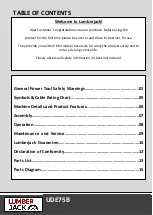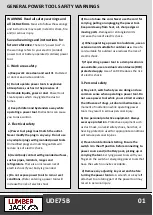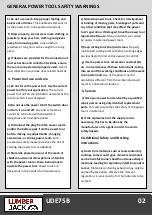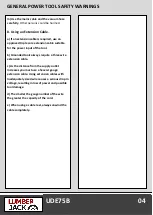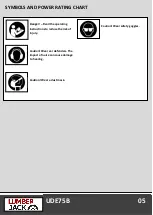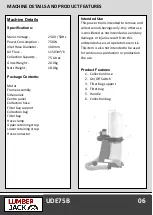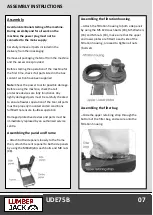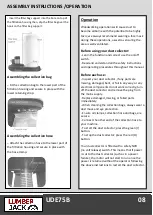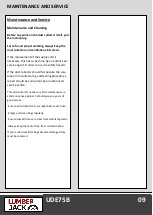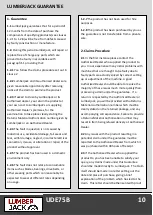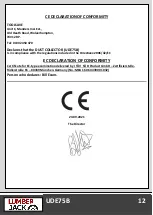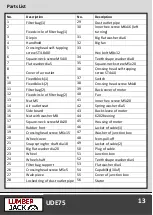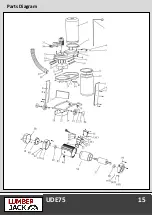
UDE
75
B
03
GENERAL POWER TOOL SAFETY WARNINGS
b) Prevent dust accumulation at the workplace.
Dusts can easily ignite.
7. Safety Warnings for Dust Extractors
a) Do not vacuum materials that are harmful to
one’s health, e. g. dust from beech or oak
wood, masonry dust, asbestos.
These materials
are considered carcinogenic
.
b) Use the dust extractor only when you fully
understand and can perform all functions
without limitation, or have received
appropriate instructions.
A thorough
introduction reduces operating errors and
injuries.
c) Do not vacuum inflammable or explosive
fluids; for example, benzene, oil, alcohol,
solvents. Do not vacuum hot or burning dust.
d) Do not operate the machine in rooms where
the danger of an explosion exists.
The dusts,
vapours or fluids can ignite or explode.
e) The dust extractor may only be used and
stored indoors.
The penetration of rain or
moisture into the dust extractor lid increases the
risk of an electric shock.
f) When operating the dust extractor in damp
environments, use a residual current device
(RCD).
Using a residual current device (RCD)
reduces the risk of an electric shock.
g) Connect the dust extractor to a properly
earthed mains supply.
The socket outlet and the
extension cable must have an operative
protective conductor.
h)
Before each use, check the dust extractor,
cable and plug. Do not use the dust extractor
when defects are detected. Do not open the dust
extractor yourself and have it repaired only by
qualified personnel using original spare parts.
Damaged dust extractor, cables and plugs increase
the risk of an electric shock.
i)
Do not drive over, crush or stretch the cable.
Do
not pull the cable to unplug the plug from the
socket outlet or to move the dust extractor.
Damaged cables increase the risk of an electric
shock.
j)
During work breaks, when not in use or when
working on the machine (e. g. changing tool
inserts, repairs, cleaning, adjustments), pull the
mains plug.
This safety measure prevents
accidental starting of the dust extractor.
k) Make sure you have ventilation in the work
area.
i) Have the dust extractor repaired only through
qualified specialists and only using original spare
parts.
This ensures that the safety of your dust
extractor is maintained.
l) Before restarting, check the condition of
the
vacuum hose. When doing this leave the
vacuum
hose mounted to the dust extractor to
avoid dust
from coming out.
Otherwise, you could
possible
y
inhale dust.
m) Do not use the dust extractor as a seat.
The
dust extractor could become damaged.


